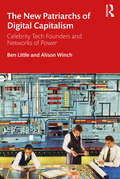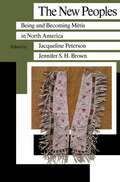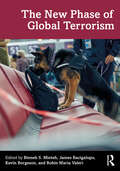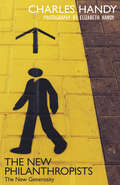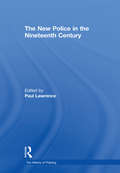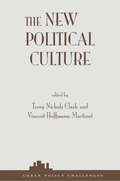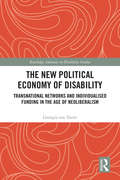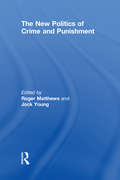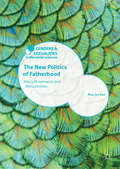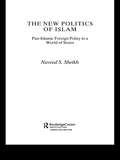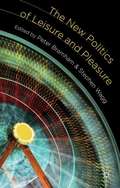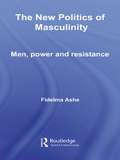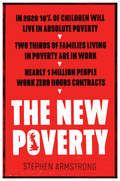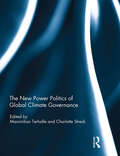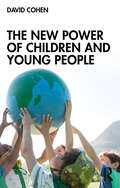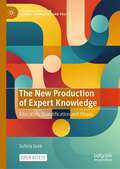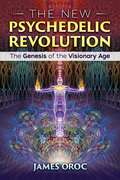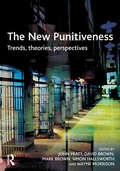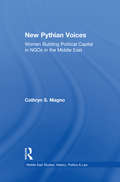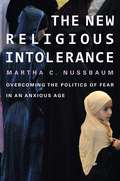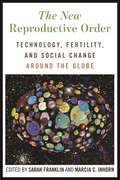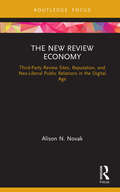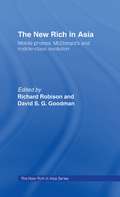- Table View
- List View
The New Patriarchs of Digital Capitalism: Celebrity Tech Founders and Networks of Power
by Ben Little Alison WinchThis book offers an original critique of the billionaire founders of US West Coast tech companies, addressing their collective power, influence, and ideology, their group dynamics, and the role they play in the wider sociocultural and political formations of digital capitalism. Interrogating not only the founders’ political and economic ambitions, but also how their corporations are omnipresent in our everyday lives, the authors provide robust evidence that a specific kind of patriarchal power has emerged as digital capitalism’s mode of command. The ‘New Patriarchs’ examined over the course of the book include: Sergey Brin and Larry Page of Google, Elon Musk of Tesla, Jeff Bezos of Amazon, Mark Zuckerberg of Facebook, and Peter Thiel. We also include Sheryl Sandberg. The book analyses how these (mostly) men legitimate their rapidly acquired power, tying a novel kind of socially awkward but ‘visionary’ masculinity to exotic forms of shareholding. Drawing on a ten million word digital concordance, the authors intervene in feminist debates on patriarchy, masculinity, and postfeminism, locating the power of the founders as emanating from a specifically racialised structure of oppression tied to imaginaries of the American frontier, the patriarchal household, and settler colonialism. This is an important interdisciplinary contribution suitable for researchers and students across Digital Media, Media and Communication, and Gender and Cultural Studies.
The New Peoples: Being and Becoming Métis (Manitoba Studies in Native History #1)
by Jacqueline Peterson Jennifer S.H.BrownLeading Canadian and American scholars explore the dimension and meaning of the intermingling of European and Native American peoples.
The New Phase of Global Terrorism
by Binneh S. Minteh, James Bacigalupo, Kevin Borgeson, and Robin Maria ValeriThe New Phase of Global Terrorism explores the nuances of the shift in the organization, strategy, and operation of terrorist groups into smaller and more robust terror groups in both the United States and international levels. To develop efficient counterterrorism measures, both domestically and globally, an understanding of the changing nature of terrorist group structure and strategy is essential. In this edited collection, authoritative scholars use relevant theories of sociology and psychology, as well as evidence from leading counterterrorism agencies such as the FBI, to support analysis, examples, and explanations of the landscape of terrorism around the world.Part I discusses the evolution, theories, and psychology of terrorism. In this part, the authors outline the rationale of the book, capturing how terrorism has changed over the years. In Part II, the book explores the new phase of domestic terrorism, drawing on left-wing extremism, right-wing extremism, and jihadist attackers in the United States with a focus on their use of lone actor attacks and decentralized networks. Part III focuses on the new phase of international terrorism and discusses operational organization and strategies of international terror groups and their capabilities in the form of combat operations and small group operatives in Sub-Saharan Africa, the Middle East, and South-East Asia. Part IV covers terrorists' use of technology for propaganda, recruitment, training, and operations, with examples from the use of technology in recruiting and training by Al-Qaeda and Islamic State in Iraq and Syria (ISIS). Part V brings this information together and analyzes the criminal justice response, including building partnerships with counterterrorism agencies, intelligence sharing, and the use of courts to bring terrorist actors to justice.Ideal as a text in terrorism, counterterrorism, and homeland security courses, this book is highly readable for criminal justice, psychology, and sociology students and professors, as well as policymakers and practitioners concerned with countering terrorism at home and abroad.
The New Philanthropists
by Charles HandyWho are the new philanthropists? And how is their philanthropy 'new'?In this remarkable and inspiring book, the eminent management writer Charles Handy and his wife Elizabeth, a portrait photographer, have collaborated to portray a new generation of practical philanthropists, men and women who have made their own fortunes and decided to move on from financial success to try to help those in need. They are doing so not simply by giving their money away to charities and agencies but by helping actively, working on the spot with the very people who need their aid, ensuring that the initiatives are sustainable in the longer term.As in their acclaimed The New Alchemists, the Handys have both interviewed and photographed their subjects in order to tell their inspiring stories; from the Sydney restaurateur Jeff Gambin, who personally helps to cook hot and cold menus for homeless people; to Niall Mellon, a young Irish property developer who is replacing the shacks with breeze-block homes in a South African township; and Sara Davenport, who sold her art gallery and set up the breast-cancer care centre the Haven Trust to offer integrated and holistic treatment and support. This striking book of words and photographs reveals the energy and inspiration of these new ways of using wealth, revealing the motivations and satisfactions of such direct action.
The New Police in the Nineteenth Century (The\history Of Policing Ser. #2)
by Paul LawrenceThe period 1829-1856 witnessed the introduction of the 'New Police' to Great Britain and Ireland. Via a series of key legislative acts, traditional mechanisms of policing were abolished and new, supposedly more efficient, forces were raised in their stead. Subsequently, the introduction of the 'New Police' has been represented as a watershed in the development of the systems of policing we know today. But just how sweeping were the changes made to the maintenance of law and order during the nineteenth century? The articles collected in this volume (written by some of the foremost criminal justice historians) show a process which, while cumulatively dramatic, was also at times protracted and acrimonious. There were significant changes to the way in which Britain and Ireland were policed during the nineteenth century, but these changes were by no means as straightforward or as progressive as they have at times been represented.
The New Policing
by Eugene MclaughlinThe New Policing provides a comprehensive introduction to the critical issues confronting policing today. It incorporates an overview of traditional approaches to the study of the police with a discussion of current perspectives. The book goes on to examine key themes, including: - the core purpose of contemporary policework; - the reconfiguration of police culture; - organisational issues and dilemmas currently confronting the police; - the managerial reforms and professional; innovations that have been implemented in recent years; - the future of policing, security and crime control. In offering this discussion of the nature and role of the police, The New Policing illustrates the need to re-examine and re-think the theoretical perspectives that have constituted policing studies. Examining evidence from the United Kingdom, the United States and other western societies, the book promotes and enables an understanding of the cultural and symbolic significance of policing in society. This ground-breaking text has been constructed to ensure that it touches on all the key issues that any course on police and policing will cover. It is an essential purchase for all students of policing and criminal justice, and academics and professionals working in this field.
The New Political Culture
by Terry Nichols ClarkThe New Political culture, which began to take shape in the 1970s, continues to challenge many assumptions of traditional politics, especially on issues of environmentalism, growth management, gay rights, and abortion. Concerned mostly with home, consumption, and lifestyle, the New Politics emerges fully in cities with more highly educated citizens, higher incomes, and more high-tech service occupations. Leadership does not come from parties, unions, or ethnic groups but rather shifts from issue to issue: leaders on abortion are distinct from leaders on environmental issues. Based on data gathered by the Fiscal Austerity and Urban Innovation Project, the most extensive study of local government in the world to date, this book provides an explicit analysis of the social structural characteristics that encourage or discourage the New Political culture. }The New Political culture, which began to take shape in the 1970s, continues to challenge many assumptions of traditional politics, especially on issues of environmentalism, growth management, gay rights, and abortion. Concerned mostly with home, consumption, and lifestyle, the New Politics emerges fully in cities with more highly educated citizens, higher incomes, and more high-tech service occupations. Leadership does not come from parties, unions, or ethnic groups but rather shifts from issue to issue: leaders on abortion are distinct from leaders on environmental issues. Based on data gathered by the Fiscal Austerity and Urban Innovation Project, the most extensive study of local government in the world to date, this book provides an explicit analysis of the social structural characteristics that encourage or discourage the New Political culture.
The New Political Economy of Disability: Transnational Networks and Individualised Funding in the Age of Neoliberalism (Routledge Advances in Disability Studies)
by Georgia van ToornThis book addresses the ways in which individualised, market-based models of disability support provision have been mobilised in and across different countries through cross-national investigation of individualised funding (IF) as an object of neoliberal policy mobility. Combining rich theoretical and interdisciplinary perspectives with extensive empirical research, the book provides a timely examination of the policy processes and mechanisms driving the spread of IF amongst countries at the forefront of disability policy reform. It is argued that IF’s mobility is not attributable to neoliberalism alone, but to the complex intersections between neoliberal and emancipatory agendas, and to the transnational networks that have blended the two agendas in new ways in different institutional contexts. The book shows how disability rights struggles have synchronised with neoliberal agendas, which explains IF’s propensity to move and mutate between different jurisdictions. Featuring first-hand accounts of the activists and advocates engaged in these struggles, the book illuminates the consequences and risks of the dangerous liaisons and political trade-offs that seemed necessary to get individualised funding on the policy agenda for disabled people. It will be of interest to all scholars and students working in disability studies, social policy, sociology and political science more generally.
The New Politics of Crime and Punishment
by Jock Young Roger MatthewsThis book provides an overview of recent government initiatives in the field of crime and punishment, reviewing both the policies themselves, the perceived problems and issues they seek to address, and the broader social and political context in which this is taking place. The underlying theme of the book is that a qualitative change has taken place in the politics of crime control in the UK since the early 1990s. Although crime has stabilised, imprisonment rates continue to climb, there is a new mood of punitiveness, and crime has become a central policy issue for the government, no longer just a technical matter of law enforcement. At the same time the politics of crime control have taken on a pronounced gender, race and age preoccupation. This book will be essential reading for anybody seeking an understanding of why crime and criminal justice policy have risen to the top of the political agenda.
The New Politics of Fatherhood: Men's Movements and Masculinities (Genders and Sexualities in the Social Sciences)
by Ana JordanThis book makes a unique contribution to contemporary research into masculinities, men’s movements, and fathers’ rights groups. It examines the role of changing masculinities in creating equality and/or reinforcing inequality by analysing diverse men’s movements, their politics, and the identities they (re)construct. Jordan advances a typology for categorising men’s movements (‘feminist', ‘postfeminist', and ‘backlash’ movements) and addresses debates over the construction of ‘masculinity-in-crisis’, arguing that ‘crisis’ is frequently invoked in problematic ways. These themes are further explored through original analyses of material produced by ‘feminist’, ‘postfeminist’, and ‘backlash’ men’s groups. The main empirical contribution of the book draws on interviews with fathers’ rights activists to explore the (gendered) implications of the ‘new’ politics of fatherhood. The nuanced examination of fathers’ rights perspectives reveals multiple, complex narratives of masculinity, fatherhood, and gender politics. The cumulative effect of these is, at best, postfeminist and depoliticising, and, at worst, another vitriolic ‘backlash’.The New Politics of Fatherhood expands scholarly understandings of gender, masculinities, and social movements in the under-researched UK context, and will appeal to readers with interests in these areas.
The New Politics of Islam: Pan-Islamic Foreign Policy in a World of States (Routledge Islamic Studies Series)
by Naveed S. SheikhThis is a timely study of the international relations of Islamic states, dealing both with the evolving theory of pan-Islamism from classical to post-caliphal times and the foreign-policy practice of contemporary states, especially Saudi Arabia, Iran and Pakistan, from the colonial period to the global aftermath of September 11. With a concise but analytic style, the book engages one-by-one with the questions of political theory, political geography and political sociology as they relate to international Islam. Its primary empirical investigation is centred on the Organization of the Islamic Conference (OIC), a powerful pan-Islamic regime, sometimes referred to as the 'Muslim United Nations'. In its theoretical deliberations on Islam and the postmodern condition, the book reconstructs contemporary understandings of how religious ideas and identities influence international politics in the Islamic world.
The New Politics of Leisure and Pleasure
by Stephen Wagg Peter BramhamThis book is about the new politics of leisure and pleasure - the values, practices, struggles and contradictions that now characterize the social worlds of rambling, drinking, tourism, sex, watching TV, gambling, using the internet, reading, comedy, sport, popular music and censorship.
The New Politics of Masculinity: Men, Power and Resistance (Routledge Innovations in Political Theory)
by Fidelma AsheThe field of masculinities research continues to expand, and has become increasingly complex. Much of the contemporary analysis of men, masculinity and power has been influenced by the work of a number of profeminist writers who have been leading figures in developing new political interventions around men’s identities and power. These men have been at the forefront of interrogations of the concept of masculinity and have attempted to develop new forms of radical gender-conscious politics for men who seek to extend gender justice. The New Politics of Masculinity is the first single-authored feminist text to engage critically with the theoretical frameworks which leading profeminist writers have developed in the field of masculinity studies. Drawing on new social movement and contemporary theory, the book examines the different models of politics that such writers have evolved for men who want to challenge dominant forms of masculinities and inequitable gender relationships. It also assesses the broader effects – on the field of men and masculinities research – of these writers’ diverse theorisations of key political concepts such as masculinity, subjectivity, power and resistance. Overall, The New Politics of Masculinity outlines the central theoretical issues for scholars and students working in the area of critical studies of masculinities, and evaluates the effects of men’s gender-conscious politics on feminist scholarship and research. The New Politics of Masculinity will be of great interest to students and scholars of gender theory, sociology, and politics.
The New Poverty
by Stephen ArmstrongWe are living in an age with unprecedented levels of poverty. Who are the new poor? And what can we do about it?Today 13 million people are living in poverty in the UK. According to a 2017 report, 1 in 5 children live below the poverty line. The new poor, however, are an even larger group than these official figures suggest. They are more often than not in work, living precariously and betrayed by austerity policies that make affordable good quality housing, good health and secure employment increasingly unimaginable.In The New Poverty investigative journalist Stephen Armstrong travels across Britain to tell the stories of those who are most vulnerable. It is the story of an unreported Britain, abandoned by politicians and betrayed by the retreat of the welfare state. As benefit cuts continue and in-work poverty soars, he asks what long-term impact this will have on post-Brexit Britain and—on the seventy-fifth anniversary of the 1942 Beveridge report—what we can do to stop the destruction of our welfare state.
The New Power Politics of Global Climate Governance
by Maximilian Terhalle Charlotte StreckThis book is based on the assumption that great powers determine global politics and, in this instance, environmental politics. It addresses the approaches of both established and rising powers and their implications for the advancement of international climate negotiations. The new introduction looks at the key developments in this realm since 2013, examining the bilateral deals between China and the United States and the results of the UNFCCC’s 21st Convention of the Parties (COP) convening at Paris in 2015. Two key features link the contributions of this volume: their underlying assumption that major powers are the central actors in determining global environmental politics; and their assessment of, and implications of, the approaches both of rising and established major powers for global climate norms. One key argument of this volume is that today’s geopolitics are about who gets how much in the fiercely competitive race over the available ‘carbon space’. The book concludes that prudently balancing power in the new century requires a fair sharing of burden among the existing and emerging powers. In light of such burden-sharing, pluralistic domestic politics as well as diverging normative beliefs and worldviews require consideration of different conditions, even if historical legacies of the industrialised world have increasingly been put into question as a political argument by the United States.This book is based on a special issue of the journal Climate Policy.
The New Power of Children and Young People
by David CohenIn a rapidly changing world, children have more of a voice than ever before. In The New Power of Children and Young People, David Cohen explores how this has happened, what the consequences might be and how we can best engage with our young people. David Cohen considers the social, political and psychological issues involved in children and young people’s influence, and how it impacts the balance of power between children and parents and other adults in their lives. It examines crucial topics including the role of high-profile young people such as Malala Yousafzai and Greta Thunberg; their knowledge of and anxieties around global issues such as climate change; children’s relationships with technology and social media; their changing relationships with parents and guardians; how children develop a sense of justice; sex and relationships; how children are depicted in TV and film; young people’s experience of education; and shines a light on their growing political confidence and engagement. Young people should be interested as well as parents, teachers, social workers, politicians and other key professionals involved in children and young people’s lives. This thought-provoking book offers insight to help us understand young people’s lives.
The New Production of Expert Knowledge: Education, Quantification and Utopia (Palgrave Studies in Science, Knowledge and Policy)
by Sotiria GrekThis Open Access book offers a novel perspective on the role of quantification in the making of education utopias through an analysis of expert knowledge and its producers. Drawing on empirical findings from the European Research Council funded project ‘International Organisations and the Rise of a Global Metrological Field’ (METRO, 2017-2022), Education, Quantification and Utopia focuses on the ways that metrological realism has constructed a well-supported epistemic infrastructure, built on relationships and practices that go beyond the mere objectivity and reliability of numerical evidence. The book’s chapters outline how the production of new forms of education expertise have led to ideational and institutional interdependencies, and ultimately the making of an intricate, fragmented and opaque knowledge and governance web.
The New Psychedelic Revolution: The Genesis of the Visionary Age
by James OrocA bold exploration of modern psychedelic culture, its history, and future • Examines 3 modern psy-culture architects: chemist Alexander “Sasha” Shulgin, mycologist-philosopher Terence McKenna, and visionary artist Alex Grey • Investigates the use of microdosing in extreme sports, the psy-trance festival experience, and the relationship between the ego, entheogens, and toxicity • Presents a “History of Visionary Art,” from its roots in prehistory, to Ernst Fuchs and the Vienna School of the Fantastic, to contemporary psychedelic art After the dismantling of a major acid laboratory in 2001 dramatically reduced the world supply of LSD, the psychedelic revolution of the 1960s appeared to have finally run its course. But the opposite has actually proven to be true, and a psychedelic renaissance is rapidly emerging with the rise in popularity of transformational festivals like Burning Man and BOOM!, the return to positive media coverage of the potential benefits of entheogens, and the growing number of celebrities willing to admit the benefits of their own personal use. Along with the return of university research, the revival of psychedelic philosophy, and the increasing popularity of visionary art, these new developments signify the beginning of a worldwide psychedelic cultural revolution more integrated into the mainstream than the counterculture uprising of the 1960s. In his latest book, James Oroc defines the borders of 21st-century psychedelic culture through the influence of its three main architects-- chemist Alexander Shulgin, mycologist Terence McKenna, and visionary artist Alex Grey--before illustrating a number of facets of this “Second Psychedelic Revolution,” including the use of microdosing in extreme sports, the tech-savvy psychedelic community that has arisen around transformational festivals, and the relationship between the ego, entheogens, and toxicity. This volume also presents for the first time a “History of Visionary Art” that explains its importance to the emergence of visionary culture. Exploring the practical role of entheogens in our selfish and fast-paced modern world, the author explains how psychedelics are powerful tools to examine the ego and the shadow via the transpersonal experience. Asserting that a cultural adoption of the entheogenic perspective is the best chance that our society has to survive, he then proposes that our ongoing psychedelic revolution--now a century old since the first synthesis of a psychedelic in 1918--offers the potential for the birth of a new Visionary Age.
The New Punitiveness
by Mark Brown David Brown John Pratt Simon Hallsworth Wayne MorrisonThroughout much of the western world more and more people are being sent to prison, one of a number of changes inspired by a 'new punitiveness' in penal and political affairs. This book seeks to understand these developments, bringing together leading authorities in the field to provide a wide-ranging analysis of new penal trends, compare the development of differing patterns of punishment across different types of societies, and to provide a range of theoretical analyses and commentaries to help understand their significance. As well as increases in imprisonment this book is also concerned to address a number of other aspects of 'the new punitiveness': firstly, the return of a number of forms of punishment previously thought extinct or inappropriate, such as the return of shaming punishments and chain gangs (in parts of the USA); and secondly, the increasing public involvement in penal affairs and penal development, for example in relation to length of sentences and the California Three Strikes Law, and a growing accreditation of the rights of victims. The book will be essential reading for students seeking to understand trends and theories of punishment on law, criminology, penology and other courses.
The New Pythian Voices: Women Building Capital in NGO's in the Middle East
by Cathryn MagnoFirst published in 2002. Routledge is an imprint of Taylor & Francis, an informa company.
The New Real: Media and Mimesis in Japan from Stereographs to Emoji
by Jonathan E. AbelUnlocking a vital understanding of how literary studies and media studies overlap and are bound together A synthetic history of new media reception in modern and contemporary Japan, The New Real positions mimesis at the heart of the media concept. Considering both mimicry and representation as the core functions of mediation and remediation, Jonathan E. Abel offers a new model for media studies while explaining the deep and ongoing imbrication of Japan in the history of new media.From stereoscopy in the late nineteenth century to emoji at the dawn of the twenty-first, Abel presents a pioneering history of new media reception in Japan across the analog and digital divide. He argues that there are two realities created by new media: one marketed to us through advertising that proclaims better, faster, and higher-resolution connections to the real; and the other experienced by users whose daily lives and behaviors are subtly transformed by the presence and penetration of the content carried through new media. Intervening in contemporary conversations about virtuality, copyright, copycat violence, and social media, each chapter unfolds with a focus on a single medium or technology, including 3D photographs, the phonograph, television, videogames, and emoji.By highlighting the tendency of the mediated to copy the world and the world to copy the mediated, The New Real provides a new path for analysis of media, culture, and their function in the world.
The New Religious Intolerance: Overcoming the Politics of Fear in an Anxious Age
by Martha C. NussbaumWhat impulse prompted some newspapers to attribute the murder of 77 Norwegians to Islamic extremists, until it became evident that a right-wing Norwegian terrorist was the perpetrator? Why did Switzerland, a country of four minarets, vote to ban those structures? How did a proposed Muslim cultural center in lower Manhattan ignite a fevered political debate across the United States? In The New Religious Intolerance, Martha C. Nussbaum surveys such developments and identifies the fear behind these reactions. Drawing inspiration from philosophy, history, and literature, she suggests a route past this limiting response and toward a more equitable, imaginative, and free society. Fear, Nussbaum writes, is “more narcissistic than other emotions. ” Legitimate anxieties become distorted and displaced, driving laws and policies biased against those different from us. Overcoming intolerance requires consistent application of universal principles of respect for conscience. Just as important, it requires greater understanding. Nussbaum challenges us to embrace freedom of religious observance for all, extending to others what we demand for ourselves. She encourages us to expand our capacity for empathetic imagination by cultivating our curiosity, seeking friendship across religious lines, and establishing a consistent ethic of decency and civility. With this greater understanding and respect, Nussbaum argues, we can rise above the politics of fear and toward a more open and inclusive future.
The New Reproductive Order: Technology, Fertility, and Social Change around the Globe
by Sarah Franklin Marcia C. InhornThe transformative impact of new reproductive technologies over the past half centuryBoth fertility and infertility are commonly depicted as individual, biological, and choice dependent conditions that can be mediated by technology. In contrast, The New Reproductive Order documents the complex material, historical, and political forces that both enable and limit human reproductivity, while also arguing that both fertility and infertility have become condensed symbols of wider changes to family forms, national political agendas, global economies, and local environments. Combining anthropological, sociological, and intersectional feminist research from across the globe, this landmark volume reveals how changing perceptions of fertility and infertility are altering how people imagine, pursue, and experience reproductivity both individually and collectively. Using a comparative global methodology based on detailed case studies, The New Reproductive Order persuasively argues that changing perceptions of fertility and infertility are giving rise to a distinctive reproductive politics based on new models of reproductive cause and effect. This groundbreaking and sophisticated volume opens new horizons of scholarship on the relationship between fertility, infertility, reproductive technologies, and social change, as well as new thinking on policy, practice, and activism in the twenty-first century’s new reproductive order.
The New Review Economy: Third-Party Review Sites, Reputation, and Neo-Liberal Public Relations in the Digital Age (Routledge Focus on Public Relations)
by Alison N. NovakThis book examines third-party review sites (TPRS) and the intersection of the review economy and neoliberal public relations, in order to understand how users and organizations engage the 21st century global review economy. The author applies communication and digital media theories to evaluate contemporary case studies that challenge TPRS and control over digital reputation. Chapters analyze famous cases such as the Texas photographer who sued her clients for negative reviews and activists using Yelp to protest the hunt of "Cecil the Lion," to illustrate the complicated yet important role of TPRS in the review economy. Theories such as neoliberal public relations, digital dialogic communication and cultural intermediaries help explain the impact of reviews and how to apply lessons learned from infamous cases. This nuanced and up to date exploration of the contemporary review economy will offer insights and best practice for academic researchers and upper-level undergraduate students in public relations, digital media, or strategic communication programs.
The New Rich in Asia: Mobile Phones, McDonald's and Middle Class Revolution (The\new Rich In Asia Ser.)
by Richard Robison David S. G. GoodmanThis is the first volume in the The New Rich in Asia series which examines the economic, social and political construction of the 'new rich' in the countries and territories of East and South East Asia, as well as their impact internationally. From a western perspective the rise of the emergent business and professional class may seem very familiar. However, it is far from clear that those newly enriched by the processes of modernization in East and South East Asia are readily comparable with the middle classes of the West. For example, civil and human rights seem to play a different role in social, political and economic change, and the State is clearly more central as an agent of economic development. This volume is the essential introduction to the series, and identifies the 'new rich' phenomenon in Indonesia, Thailand, Singapore, Malaysia, Korea, China, Hong Kong and Taiwan. The contributors demonstrate that the key to understanding the 'new rich' is to realise that they are neither a single category or class, but in each setting a series of different socio-political groups who have a common inheritance from the process of rapid economic growth.
